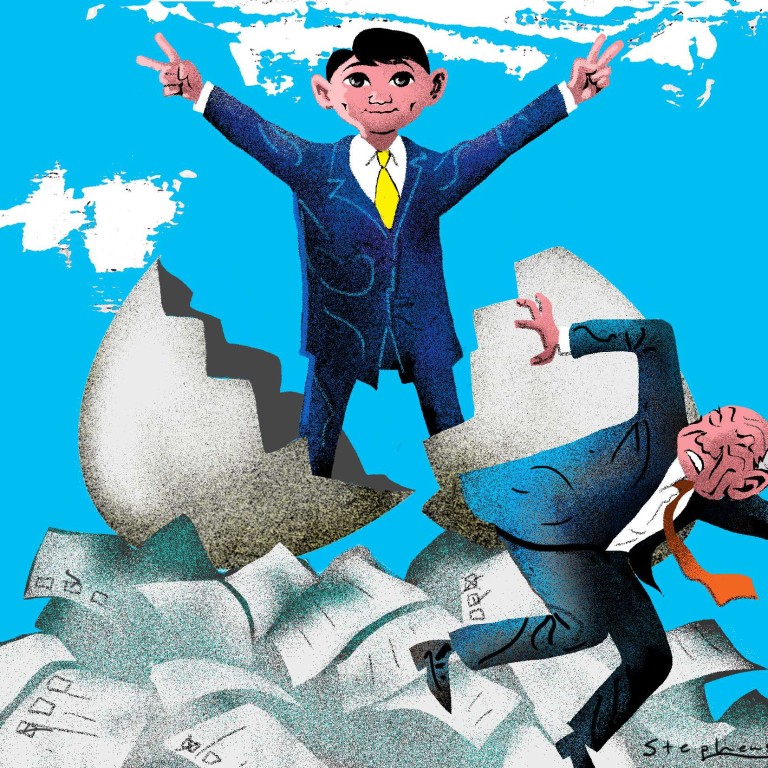
A long night ... and a big day for Hong Kong’s political novices
Gary Cheung says veterans with a track record of service were no match for fresh-faced candidates in the city’s legislative election, reflecting the failure of Beijing’s hardline approach

A record 2.2 million people voted in the five geographical constituencies, taking the turnout rate to 58 per cent. That was 2.4 percentage points higher than the previous record rate in 2004. Sunday’s figures, in both absolute numbers and percentage terms, were the highest since direct elections were first introduced in 1991.

Sorry about the wait: Hong Kong official apologises for long queue at Taikoo polling station
Hong Kong people can take pride in Sunday’s turnout rate, which was just 8 percentage points lower than that for Taiwan’s presidential election in January. It should be noted thatthe stakes in this Legco election were nowhere as high as for Taiwan’s presidential poll, which returned a leader with wide-ranging powers, including how to handle the island’s ties with mainland China. The turnout rate in Hong Kong was also comparable to that in elections in some Western democracies. The 19-hour polling day will go down in history as a marker in Hong Kong’s democratic development.
The dramatic successes and failures of this poll, in part the result of strategic voting by a substantial proportion of voters, will take Hong Kong into unchartered political waters. The demise of veteran pan-democratic lawmakers, such as Lee Cheuk-yan and Frederick Fung Kin-kee, who are known for their record in championing grass-roots’ and labour rights, shows that experience and a good track record may not count for much these days. Many voters, particularly young electors, prefer political novices even if their platforms are not convincing and, in some cases, even laughable. Fung, who in the 1980s and 1990s was unbeatable as a candidate in Kowloon West, lost yesterday after clinching only about 17,800 votes in New Territories West.
Youngspiration, which won two seats, proposed in its election platform that Hong Kong should exploit natural gas resources in an “exclusive economic zone”, a term used in international law to delineate the right to use ocean resources and which implies sovereignty. The localist group, which calls for the city’s “self-determination”, aimed to show voters with this proposal that Hong Kong could stand on its own two feet even if it broke away from China. At an election forum held two weeks ago, Yau Wai-ching, the 25-year-old Younspiraton candidate who won a seat in Kowloon West, was left stuttering when she was asked by Democratic Party candidate Helena Wong Pik-wan how to deliver on her group’s ambitious proposal.
The defeat of incumbent pan-democratic lawmaker Gary Fan Kwok-wai, whose group the NeoDemocrats boasts solid district work in New Territories East, is a harsh reality check that in the current volatile political climate, no-nonsense hard work in neighbourhoods may not be a passport to success in a Legco election. In the district council elections last November, no pan-democratic group fared better than the NeoDemocrats, which won 15 of their 16 bids for seats, a 93.8 per cent success rate.
Another day, another election – and Hong Kong is still waiting for political reform

The poor results of three candidates who advocate a moderate approach in the fight for democracy – the Third Side’s Tik Chi-yuen and two candidates from the Path of Democracy, Raymond Mak Ka-chun and Gary Wong Chi-him – are another testament to the tightening space for moderates in Hong Kong’s sharply polarised political landscape.
Many voters prefer political novices even if their platforms are not convincing, or even laughable
The compromise proposal put forward by Ronny Tong Ka-wah, who founded the Path of Democracy, and other moderates was brushed aside by the central government two years ago when the city was debating how to elect the chief executive by universal suffrage in 2017. Their proposal would not allow the public to nominate chief executive hopefuls for the 2017 election.
The zero-risk model eventually adopted by Beijing, under which only two or three candidates could run for the position, while a successful candidate must win majority support from a 1,200-member nominating committee, effectively alienated those who advocate dialogue with Beijing and made the moderates look ineffectual compared with the radical pan-democrats.
The growing negative perceptions of Beijing among young people in the aftermath of the failed electoral reform and the Occupy movement have provided fertile soil for the growth of localism and separatism. Forced now to watch six localists win seats in Legco, Beijing is tasting the bitter fruit of its hardline approach.

Legco losses for veteran pan-democrats signal end of era
The only silver lining is that most winners from the localist camp are moderate backers of self-determination. Time is running out for the central government to come up with a more pragmatic approach to Hong Kong, lest dozens of localists who do not wish to engage in dialogue with Beijing enter the legislature four years on from now.
Thanks to the proportional representation system, which encourages like-minded candidates to run on separate tickets, elections over the years have produced an increasingly fragmented legislature. When direct election was first introduced in 1991, the United Democrats won a landslide victory, clinching 12 of the 18 directly elected seats. Another pro-democracy group, the Meeting Point, which merged with the United Democrats in 1994 to form the Democratic Party, won another two seats.
In the 1995 Legco election, the Democratic Party won 19 out of 60 seats in the legislature. Then party chairman Martin Lee Chu-ming advocated a brand of “new consensus politics”, as he believed his party should behave responsibly.
Today, the increasingly divided legislature will make it more difficult for groups to cross the political aisle to forge a consensus on issues, including those relating to livelihood. Officials should expect a very tough time dealing with lawmakers in the final year of Chief Executive Leung Chun-ying’s current term of office.
Gary Cheung is the Post’s political editor

